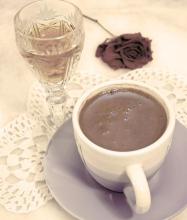Introduction to the delicious Coffee Flavor in Columbia Coffee Manor
The main varieties of Colombian coffee are small grains of coffee. Plants are small trees or large shrubs, 5-8 m tall, usually much branched at base; old branches gray-white, nodes dilated, young branches glabrous, compressed. Leaves thinly leathery, ovate-lanceolate or lanceolate, 6-14 cm long and 3.5-5 cm wide, apex long acuminate, acuminate part 10-15 mm long, base cuneate or slightly obtuse, rarely rounded, entire or shallowly wavy, both surfaces glabrous, lower vein axils with or without small pores; midrib raised on both surfaces of leaf, 7-13 on each side of lateral veins; petiole 8-15 mm long Stipules broadly triangular, arising from the tip of the upper part of the young branch conical or awn tip, the tip of the old branch is often protruding tip, 3-6 mm long. Cymes are several clustered in leaf axils, each with 2-5 flowers, without a total pedicel or with a very short peduncle; the flowers are fragrant, with pedicels 0.5-1 mm long; the base of bracts more or less coincides with the pure flavor of Colombian coffee, from Colombia's natural environment with the most favorable conditions for coffee growth. But beyond that, it is inseparable from the hard work of local growers. In Colombia, coffee cultivation has reached 1.07 million hectares, there are about 302000 coffee plantations in the country, and 30 to 40 per cent of the rural population depends directly on coffee production. Although there are many farms in Colombia, they are not large in area. The area of each farm is only about 2 hectares, and more than 80% of the coffee plantations have only about 5000 coffee trees, an average of 3000. Thus it can be seen that agriculture in Colombia belongs to the small-scale farm type. The locals plant tall trees or banana trees around the coffee trees. Build an Arbor for coffee trees at the seedling stage to ensure the cool and humid environment needed for coffee growth. Due to the high humidity, small temperature difference and slow ripening of coffee beans in the coffee forest, which is conducive to the accumulation of caffeine and aromatic substances, the best quality of coffee is Medellin in terms of yield and texture, which is characterized by full granules of coffee beans, rich nutrition, moderate acidity, good balance, rich aroma and soft and smooth taste. In addition to Medellin, the capitals of two neighboring provinces in the south, Armenia and Manizales, are also famous coffee producers, which formerly belonged to Medellin's province of Andiquio, which had a Caldas football team that played in the last Toyota Cup. These three places form the world-famous "coffee belt" coffee is the pride of Colombians, Colombians like to talk about a few things, in addition to their football, which was once one of the best in the world, is the coffee they are proud of. Drinking coffee in Colombia is a pleasure. Not only is it necessary three times a day, but the streets are full of cafes and customers are full of seats from morning till night. There is no instant saying in the cafe. It is now cooked and sold. The young lady pours it with exquisite porcelain bowls, respectfully presents it to the customers, and adds sugar at will. The aroma is pervasive in the room, the bowl is sweet and delicious, and the slow taste is endless in aftertaste. No wonder the local people are addicted to it.
At the University of Andean, there is a small card in every office that says "Coffee time". If the host is temporarily out, it is likely to be hung at the door. This seems to be a legitimate reason, even for executives who are on duty. In any restaurant in Medellin, the free drink served by the clerk after the meal is coffee.

Important Notice :
前街咖啡 FrontStreet Coffee has moved to new addredd:
FrontStreet Coffee Address: 315,Donghua East Road,GuangZhou
Tel:020 38364473
- Prev

Introduction to the Fine Coffee Bean Manor in Rwanda Coffee Flavor and taste area
Since the 1920s, Arabica coffee grown in Rwanda has been famous for its unique fruit sweetness and rich grass aroma. In recent years, the Rwandan government has taken positive measures to vigorously promote coffee production, set up coffee production cooperatives in various places, and give technical guidance and financial support to farmers, so that coffee production has made considerable progress. University of Rwanda
- Next

Introduction to the flavor and taste of Lindong Coffee Manor in Sumatra, Indonesia
Mantenin's leaping acid mixes with the richest aroma, giving you a relaxed body flavor to a lively factor in a mild fragrance, and its outstanding taste captivates many suitors. In the 17th century, the Dutch introduced Arabica seedlings to Ceylon (present-day Sri Lanka) and Indonesia. In 1877, a large-scale disaster hit the Indonesian islands, and coffee rust destroyed.
Related
- Detailed explanation of Jadeite planting Land in Panamanian Jadeite Manor introduction to the grading system of Jadeite competitive bidding, Red bid, Green bid and Rose Summer
- Story of Coffee planting in Brenka region of Costa Rica Stonehenge Manor anaerobic heavy honey treatment of flavor mouth
- What's on the barrel of Blue Mountain Coffee beans?
- Can American coffee also pull flowers? How to use hot American style to pull out a good-looking pattern?
- Can you make a cold extract with coffee beans? What is the right proportion for cold-extracted coffee formula?
- Indonesian PWN Gold Mandrine Coffee Origin Features Flavor How to Chong? Mandolin coffee is American.
- A brief introduction to the flavor characteristics of Brazilian yellow bourbon coffee beans
- What is the effect of different water quality on the flavor of cold-extracted coffee? What kind of water is best for brewing coffee?
- Why do you think of Rose Summer whenever you mention Panamanian coffee?
- Introduction to the characteristics of authentic blue mountain coffee bean producing areas? What is the CIB Coffee Authority in Jamaica?

